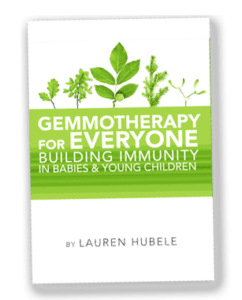Happy Healthy Babies IX: Your Baby’s Microbiome
June 8, 2018
Over these past weeks, I have taken the opportunity to address a variety of common baby ailments from croup to colic to eczema. While all are seemingly simple symptoms, each is actually an important not to be ignored or suppressed expression of your baby’s body. Each occurs because baby’s elimination is not optimal and emergency exits to clean are being tasked in the lungs, skin, or through the nose.
While it is the common and accepted conventional approach to quiet these symptoms with medication I have asked that you might consider an alternative. Rather than turning these inflammatory responses inward and disrupting baby’s developing systems, I suggest you consider instead a therapy to optimize elimination and enhance the body’s own capability to clean and self heal.
In my opinion, there is no better therapy for this than Gemmotherapy extracts that contain the meristems (plant stem cells) of specific trees and shrubs. The inclusion of the meristem material gives Gemmotherapy extracts the ability to simultaneously clean and heal organ tissue on a cellular level. This cleaning and healing reduces and eliminates inflammation rather than suppresses it. This is critical for all humans but particularly so during the first years of a developing immune system.
The Developing Immune System
What we are now learning about the human microbiome lends further credit to the supportive action of Gemmotherapy extracts to address baby’s symptoms as opposed to potentially harmful medication. The term, Microbiome, refers to the population of microbes that cover every surface of our bodies, both inside and out. Microbes are microscopic life forms that represent thousands of species, outnumbering our own cells by about 10 to 1. The populating of our microbiome occurs from birth with our first strains coming from skin to skin contact with our mother and through breastfeeding. A healthy diversified microbiome leads to a healthy immune system.
A Baby’s First Years
Microbiome is no doubt the scientific buzzword of the day but it is more than a fad and something with which every expectant parent and those with young infants need to familiarize themselves. While our microbiome continues changing throughout our lifetime, we now know that the first three years of life are most critical. New and Expectant Parent Alert: This first three year period of a child’s life is when the immune system matures and every precaution must be taken to protect rather than challenge this system.
“The microbial makeup a child has at three is the one he or she will carry into adulthood. So this is the most vulnerable period, during which messing with the microbiome could have longer-term implications.” according to Ramnik Xavier, a gastroenterologist at the Broad Institute of MIT and Harvard, Massachusetts General Hospital’s Center for Computational and Integrative Biology, and Harvard Medical School.
What messes with the microbiome? The three top interferences in infants come from
- C-section deliveries
- Formula feeding
- Antibiotics (for mom or baby)
Supporting the Developing Microbiome
Vaginally delivered babies are covered in a film of microbes from their mother as they enter the world. This simply does not occur with C-section deliveries. However, hospital studies have been conducted that have investigated the success of “swabbing” babies with gauze containing microbes from mom. Thus far the studies have proven that a transfer of microbes from mom to infant CAN occur in this manner.
Breast milk has been the preferred food for infants for years and now this has even more backing with recent studies. Beneficial bacteria from mom are delivered directly to baby’s gut with each breastfeeding, supporting the development of a diverse microbiome. This makes a strong case for the use of probiotics in infants who must be formula fed.
It has become clear that the use of antibiotics can send the microbiome into a state of chaos, when given at birth or after. This study has even found a three-way link among antibiotic use in infants, changes in the gut bacteria, and disease later in life.
Early imbalances in gut microbes have been tied to infectious diseases, allergies and other autoimmune disorders, and even obesity later in life. A recent Harvard Magazine article, How Antibiotics Disrupt Babies’ Microbiomes, states research that has found fewer strains of microbes in antibiotic-exposed children’s intestines and a less diverse microbiome creates a less stable microbial community.
The same article goes on to explain that having a diverse, rich, complex, microbial community is important for the immune education of the gut. According to this, growing up in a too-clean environment may actually be a bad thing because exposure to germs in early life is necessary to help train the developing immune system. Something extremely important to think about as it has become a trend to overprotect baby and baby’s environment.
While all of this just barely scratches the surface given the vast knowledge available on the human microbiome my hope is that it will pique your curiosity on the topic and lead to further research on your own.
Check back next week when I wrap up this Happy Healthy Baby series and offer clear steps expectant and new parents can take to support their developing infant before and after delivery.
Learn more about how you can build your child’s immune system in my recent book full of easy to use Gemmotherapy protocols for everything from colic to skin conditions. An indispensable guide for anyone caring for young ones. If diving deeper into Gemmotherapy is on your mind then consider joining me in September for my next Foundations of Gemmotherapy series.
Immunity matters!
Learn to support your health naturally with weekly tips
delivered straight to your inbox.

